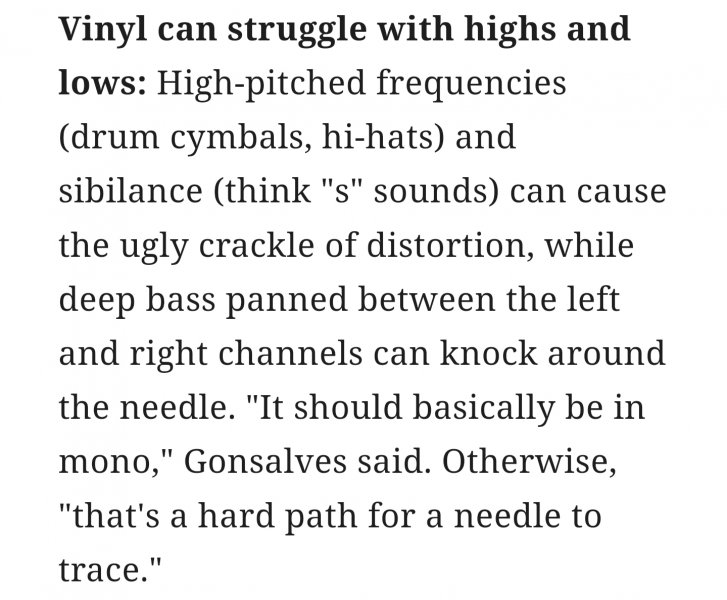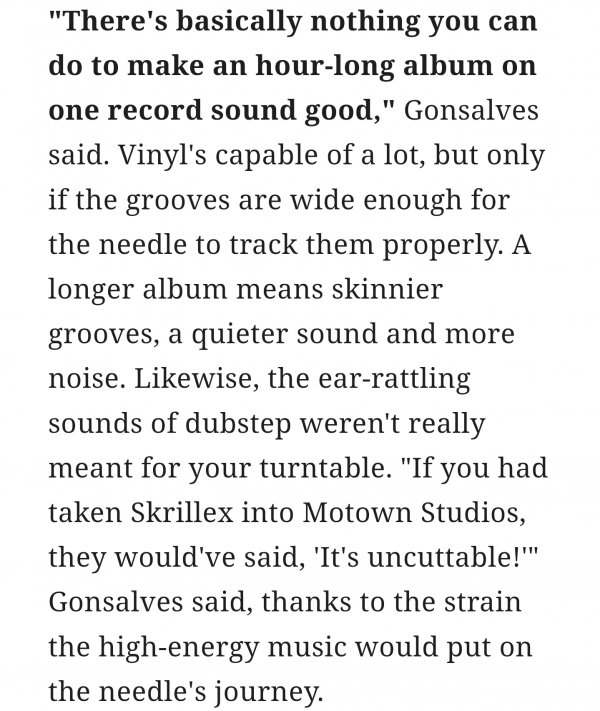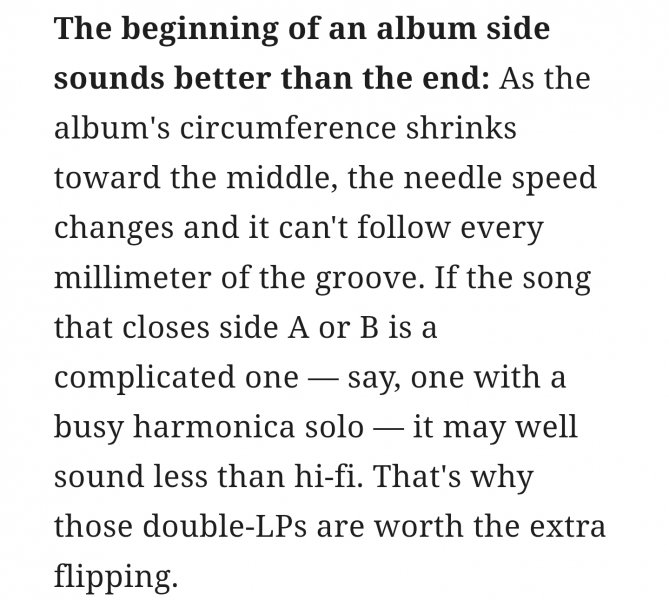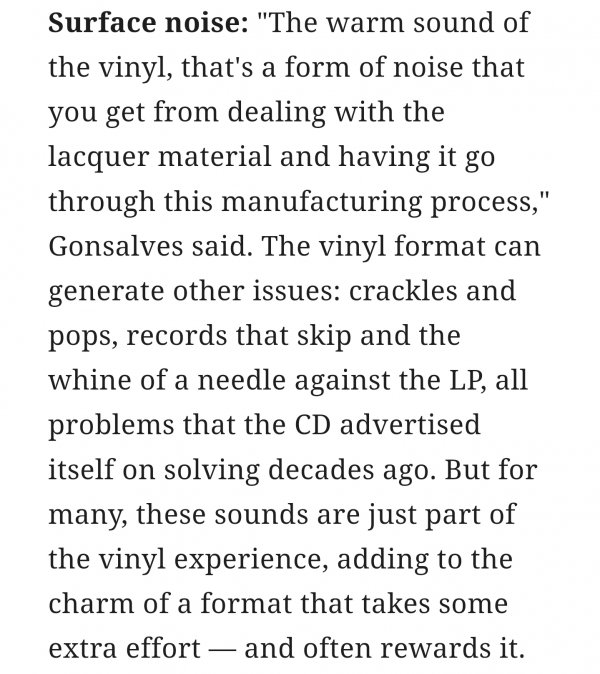This thread has become tiresome to me. I think I’m going to listen to some musical bliss with some vinyl.
Can digital get to vinyl sound and at what price?
- Thread starter ScottK
- Start date
You are using an out of date browser. It may not display this or other websites correctly.
You should upgrade or use an alternative browser.
You should upgrade or use an alternative browser.
- Status
- Not open for further replies.
I am just wondering if some of the participants here, not to name them, have enough experience to even know what they want.
Maybe a little bit more humility and less of a footprint. It ok not to know about all things, but do you have to flaunt it constantly!Dude
What do you want from me?
Republicoftexas69
Well-Known Member
That is not completely true but okay.Considering that most if not all vinyl lps are cut from digital masters, you may be beating a dead horse.
I have a couple records that I also can find on streaming. I can't tell them apart on my system. I have brought them to friends and done the same test on stereo that would be considered very high end. Some $300k type stuff. Again, we could not tell the difference. The point being, what impact does going from digital to vinyl have. Also, what impact does going from a possible 36x384 or higher to 16x44.1 have. And, what did the company that makes a disc do? I had a friend who gave me his CD. I explained why it sounded like crap. He went back to the studio and they noted the master did not sound like the CD. Turns out the company putting the files to CD made their own alterations. Point being, there appears to be some stepping on a file from what is mastered in the control room to what is available to stream or on a disc.
Theoretically there shouldn't be a difference especially with hi res digital .
But obviously there could be a less than perfect transfer in some cases
But obviously there could be a less than perfect transfer in some cases
I have a couple records that I also can find on streaming. I can't tell them apart on my system. I have brought them to friends and done the same test on stereo that would be considered very high end. Some $300k type stuff. Again, we could not tell the difference. The point being, what impact does going from digital to vinyl have. Also, what impact does going from a possible 36x384 or higher to 16x44.1 have. And, what did the company that makes a disc do? I had a friend who gave me his CD. I explained why it sounded like crap. He went back to the studio and they noted the master did not sound like the CD. Turns out the company putting the files to CD made their own alterations. Point being, there appears to be some stepping on a file from what is mastered in the control room to what is available to stream or on a disc.
Theoretically there shouldn't be a difference especially with hi res digital .
But obviously there could be a less than perfect transfer in some cases
It's not only a matter of hi-res and "transfer". Watch that Bernie Grundman video that was posted earlier in the thread.
@AudioGod I believe the applicable metaphor is: you're pissing into the wind. Best regards...
I thought this thread is about discussing the advantages and disadvantages of vinyl and digital@AudioGod I believe the applicable metaphor is: you're pissing into the wind. Best regards...
i've now put AudioGod officially on ignore. YMMV
@AudioGod - While we cannot control what you post, I would like to point out one of the TOS of the forum -
17. While we rule with a gentle hand in managing the forum, we reserve the right to terminate membership of anyone that we believe in our sole opinion to be disruptive to the well being of the community.
You are at this point now. Not answering basic questions, being a broken record, beating the dead horse and doing what it is you are doing, is a general disruption to this forum. Please take a step back or we will have to take administrative action. We do welcome a healthy debate but it's usually filled with quality posts, not quantity posts.
This is NOT open for public debate and if you have an issue with it, please feel free to contact me directly. Enough is enough already.
Tom
17. While we rule with a gentle hand in managing the forum, we reserve the right to terminate membership of anyone that we believe in our sole opinion to be disruptive to the well being of the community.
You are at this point now. Not answering basic questions, being a broken record, beating the dead horse and doing what it is you are doing, is a general disruption to this forum. Please take a step back or we will have to take administrative action. We do welcome a healthy debate but it's usually filled with quality posts, not quantity posts.
This is NOT open for public debate and if you have an issue with it, please feel free to contact me directly. Enough is enough already.
Tom
Republicoftexas69
Well-Known Member
Now you are playing the victim card after alienating so many. Ignored!It's so horrible of me
To bring relevant facts into a discussion
I would like to say I'm sorry to anyone here.
Why is it not possible to know whether the reproduction is accurate or close to accurate or not? When you record something in your studio and then play it back at home, you can tell whether your system has reproduced the music close to how you heard in the mastering studio, right?It is perhaps not possible to know what is "accurate", but it is certainly possible to know what is inaccurate. Anything that has non-linearity in frequency, phase and/or dynamic response is inaccurate.
As it is not my personal objective, I am not well-qualified to answer your question. Perhaps Chuck can answer.How is one able to judge success in this specific audio objective? I understand about theoretical objectives and your attempts to categorize, but this one would seem more objective than subjective, and I do not understand how we could ever know how close we are so it seems like an elusive quest.
it is on my list of possible high-end audio objectives because I believe it to be the conceptual objective of many audiophiles.
Last edited:
some of you need to stop chasing something and enjoy the music, reading this is exhausting. out for tonight, going to spin some dean martin an suggest some of you do as well
If what you are saying means you need an inaccurate reproduction of the signal in order to sound "musical", just how inaccurate does it have to be ?
From my subjectivist point of view there is a threshold fallacy that you are not recognizing. The threshold fallacy is your belief that there is an accurate, objective, immutable signal to begin with.
+1The original recording doesn’t make a sound unless it is played through a system. Each system is different, so how can we ever know with the original sounds like?
As it is not my personal objective, I am not well-qualified to answer your question. Perhaps Chuck can answer.
it is on my list of possible high-end audio objectives because I believe it to be the conceptual objective of many audiophiles.
Ron, I thought it was one of four specific goals you came up with. You defined them and I had assumed you could explain them. I am simply asking if it makes any sense.
Ron, I thought it was one of four specific goals you came up with. You defined them and I had assumed you could explain them. I am simply asking if it makes any sense.
Peter, since I don't consider that objective to be one of my personal objectives, I view it as a conceptual objective, not an objective which can be achieved. The people for whom it is their high-end audio objective believe it can be achieved.
I assume they would say what AudioGod says: that the master tape or the digital file can be reproduced accurately with low distortion solid-state electronics and low-distortion loudspeakers. Hence, they believe they are reproducing accurately what is on the master tape or digital file.
- Status
- Not open for further replies.
Similar threads
- Replies
- 139
- Views
- 6K
- Replies
- 42
- Views
- 5K
- Replies
- 2
- Views
- 577
- Replies
- 45
- Views
- 8K
| Steve Williams Site Founder | Site Owner | Administrator | Ron Resnick Site Owner | Administrator | Julian (The Fixer) Website Build | Marketing Managersing |














